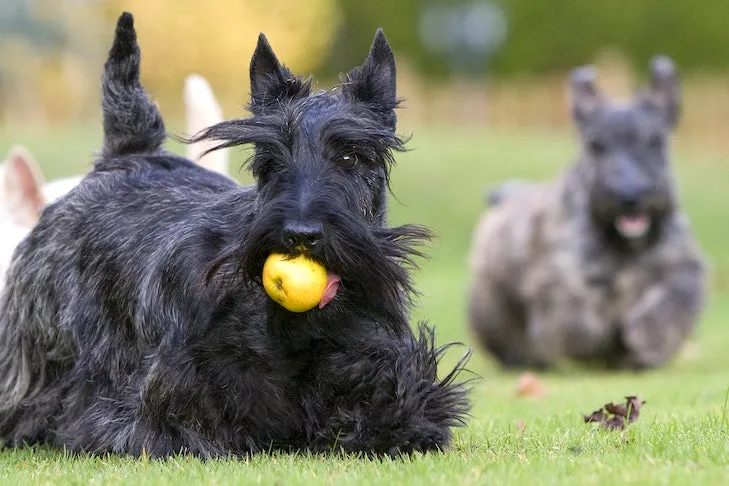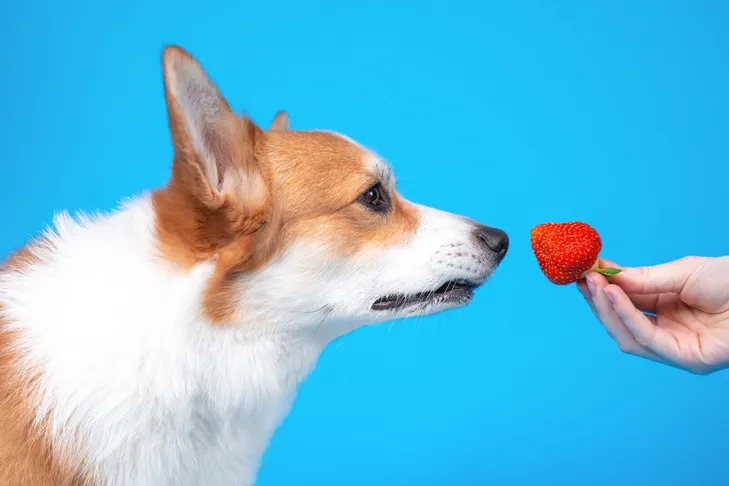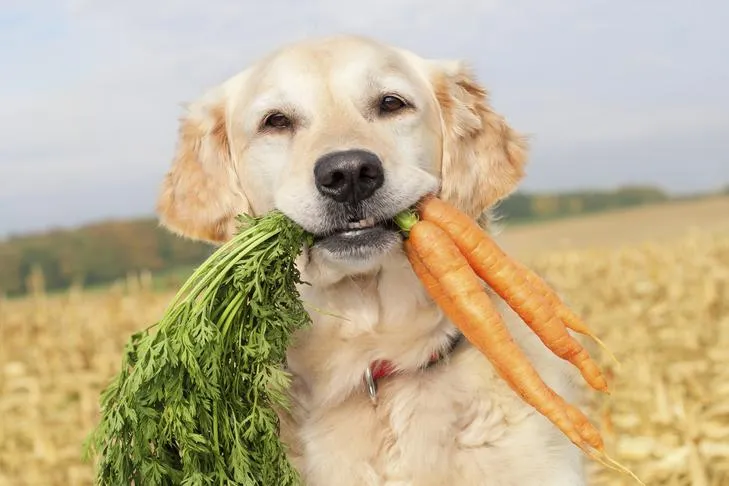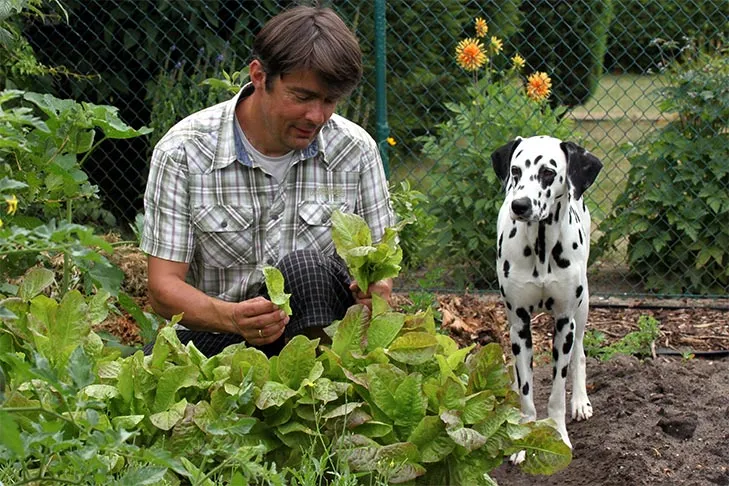As loving pet parents, it’s natural to want to share your favorite snacks with your furry companion. However, what’s healthy for humans isn’t always safe for dogs. The digestive systems of dogs operate differently from ours, meaning certain fruits and vegetables, while beneficial for us, can lead to serious health issues, long-term problems, or even be fatal for our canine friends. Understanding which produce items are safe for your dog to consume and which are strictly off-limits is crucial for their well-being. While dogs are omnivores and don’t strictly require fruits or vegetables in their daily diet, offering them as occasional treats or snacks can provide extra vitamins, minerals, and fiber, provided they are dog-safe.
This comprehensive guide will help you navigate the world of fruits and vegetables, identifying those that are safe to share in moderation and those that should be avoided at all costs to ensure your dog stays happy and healthy. Ensuring your dog’s diet is safe and balanced is paramount, and knowing what foods are safe for dogs to eat is the first step towards responsible pet ownership.
Fruits Dogs Can Safely Enjoy in Moderation
Many fruits offer a healthy and delicious treat option for dogs when given in appropriate quantities. These fruits are packed with essential vitamins, minerals, and antioxidants that can contribute to your dog’s overall health. Remember to always prepare them properly by removing any potentially harmful parts and serving them in bite-sized pieces.
Apples
Apples are a fantastic source of vitamins A and C, along with beneficial fiber for your dog. Their low protein and fat content make them an ideal snack, especially for senior dogs. Always remove the seeds and core before offering apples, as apple seeds contain small amounts of cyanide. For a refreshing treat on a warm day, try them frozen. You can also find apple as a natural ingredient in many dog treats.
 Scottish Terriers playing in the grass, enjoying the outdoors.
Scottish Terriers playing in the grass, enjoying the outdoors.
Bananas
Bananas are a great low-calorie treat for dogs when given sparingly. They are rich in potassium, various vitamins, biotin, fiber, and copper, while being low in cholesterol and sodium. However, due to their high sugar content, bananas should be offered as an occasional treat rather than a regular part of their diet. Many dog treats also incorporate banana for its nutritional benefits.
Blueberries
Often hailed as a superfood, blueberries are brimming with antioxidants that help prevent cell damage in both humans and canines. They are also packed with fiber and phytochemicals. Blueberries are small and easy for dogs to eat, making them a popular choice for training rewards. You’ll frequently find this powerful fruit in blueberry dog treats, sometimes combined with other healthy ingredients like yogurt.
Cantaloupe
Cantaloupe is not only delicious but also packed with nutrients, low in calories, and an excellent source of water and fiber. Its high sugar content, however, means it should be given in moderation, particularly to dogs who are overweight or have diabetes. Freezing small balls or cubes of cantaloupe can provide a refreshing and enriching summer snack for your canine companion.
Cranberries
Both fresh and dried cranberries are safe for dogs in small quantities. While some dogs might not appreciate their tart taste, moderation is key to prevent an upset stomach, as with any treat. Be mindful that many dried cranberries for human consumption are sweetened, adding unnecessary sugar to your dog’s diet. Opt for unsweetened fresh or frozen cranberries, or choose crunchy cranberry dog treats.
Cucumbers
Cucumbers are particularly beneficial for overweight dogs because they contain very few carbohydrates or fats and are loaded with hydrating water content. They also provide vitamins K, C, and B1, along with potassium, copper, magnesium, and biotin. Cool cucumbers make an excellent hot-weather treat, and frozen slices can offer a fun, enriching snack.
 A Russell Terrier comically posing with cucumber slices on its face.
A Russell Terrier comically posing with cucumber slices on its face.
Mango
This sweet and juicy tropical fruit is a powerhouse of vitamins A, B6, C, and E, as well as potassium, beta-carotene, and alpha-carotene. It’s crucial to remove the hard pit first, as it contains small amounts of cyanide and poses a significant choking hazard. Due to its high sugar content, mango should be an occasional treat, especially for dogs prone to weight gain. Chewy mango dog treats offer a less messy way for your dog to enjoy its nutritional benefits.
Oranges
According to veterinarians, oranges are safe for dogs to eat, though some dogs may be deterred by the strong citrus smell or taste. Oranges are an excellent source of vitamin C, potassium, and fiber. In small amounts, the juicy flesh can be a tasty treat. It’s recommended to remove the orange peel and any seeds, as the peel can be tough on their digestive systems, and the oils might be too potent for their sensitive noses. If your dog isn’t keen on fresh citrus, several dog treats incorporate orange flavor.
Peaches
Small amounts of fresh or frozen cut-up peaches are a good source of fiber and vitamin A. However, like cherries, peach pits contain cyanide. Ensure you completely remove the flesh from the pit before serving, and dispose of pits securely in dog-proof receptacles. Avoid canned peaches, which often contain high amounts of sugary syrups, even those labeled “in natural juice.” Frozen peach slices can be a delightful and cooling summer treat.
Pears
Pears are a beneficial snack, rich in copper, vitamins C and K, and fiber. When sharing pears with your dog, always cut the flesh into bite-sized chunks and remove the pit and seeds, as they contain traces of cyanide. As with peaches, skip canned or jarred pears with sugary syrups. Pear dog treats, sometimes with other functional ingredients like duck or salmon, are also available.
Pineapple
A few chunks of pineapple can be a sweet and healthy treat for dogs, provided the prickly outer peel and crown are removed. This tropical fruit is packed with vitamins, minerals, and fiber. It also contains bromelain, an enzyme that aids dogs in absorbing proteins. Avoid canned or packaged pineapple in sweetened syrups due to added sugars, especially if your dog is prone to obesity. Pineapple-flavored dog treats offer a convenient option.
Pumpkin
Pure pumpkin is a highly beneficial food for dogs. It’s rich in antioxidants, but its most notable benefit is its ability to help relieve both diarrhea and constipation in dogs. If you’re buying canned pumpkin, always choose 100% pumpkin puree, not pie filling. You can also roast pumpkin yourself and feed the peeled flesh to your dog. Many pumpkin supplements and treats are also available.
Raspberries
Raspberries are safe for dogs in moderation. They contain beneficial antioxidants, are low in sugar and calories, but high in fiber, manganese, and vitamin C. Raspberries are particularly good for senior dogs due to their anti-inflammatory properties, which can support aging joints. Raspberries naturally contain small amounts of xylitol, so limit your dog to no more than 8 ounces of fresh or frozen raspberries.
Strawberries
Strawberries are an excellent source of fiber and vitamin C. They also contain an enzyme that can help whiten your dog’s teeth. Like all fruits, strawberries contain natural sugar, so they should be offered in moderation. Frozen strawberries can provide an enjoyable enrichment treat for dogs.
 A Pembroke Welsh Corgi inquisitively sniffing a strawberry on a blue background.
A Pembroke Welsh Corgi inquisitively sniffing a strawberry on a blue background.
Watermelon
Dogs can eat watermelon, but it’s vital to remove the rind and seeds beforehand, as they can cause intestinal blockage. The flesh of the watermelon is safe and is packed with vitamins A, B-6, and C, as well as potassium. Comprising 92% water, watermelon is a fantastic way to keep your dog hydrated on hot summer days. Freezing chunks of seeded watermelon makes for a delightful hot-weather enrichment treat.
What Fruits and Vegetables Can Dogs Not Eat? Fruits to Avoid
While many fruits are healthy for humans, some contain compounds, seeds, or parts that are dangerous or even toxic to dogs. It is paramount to keep these fruits out of your dog’s reach to ensure their safety and prevent serious health issues. Always be aware of what not to feed dogs list to protect your canine companion.
Avocado
Despite being a healthy snack for humans, avocado should not be given to dogs. The pit, skin, and leaves of avocados contain persin, a toxin that can often lead to vomiting and diarrhea in dogs. While the fleshy inside of the avocado fruit has less persin, it can still be too much for dogs to handle. Additionally, avocado flesh is high in fat, which can cause gastrointestinal upset or contribute to conditions like pancreatitis if consumed in large quantities.
Cherries
With the exception of the fleshy fruit around the seed, all parts of cherry plants contain cyanide and are toxic to dogs. Cyanide disrupts cellular oxygen transport, preventing your dog’s blood cells from getting enough oxygen. If you have a cherry tree, ensure your dog doesn’t have access to fallen fruit. Symptoms of cyanide poisoning, such as dilated pupils, difficulty breathing, and red gums, require immediate veterinary emergency care. When you enjoy cherries, dispose of pits securely in a dog-proof trash can.
Grapes
If you suspect your dog has eaten grapes or raisins, contact your veterinarian immediately. Grapes and raisins are highly toxic to dogs, regardless of breed, sex, or age. Their consumption can lead to acute sudden kidney failure. Always be vigilant about this dangerous fruit, especially if children are eating grapes or raisins in your home. Ensure all discarded grapes or raisins are inaccessible to your dog, whether in a dog-proof trash can or compost heap.
Tomatoes
While the ripened flesh of the tomato fruit is generally considered safe for dogs, the green parts of the tomato plant, including stems and leaves, contain a toxic substance called solanine. Although a dog would need to ingest a significant amount of the plant to become ill, it’s safer to avoid feeding tomatoes altogether. If your dog enjoys exploring the garden, take steps to prevent access to tomato plants.
 A Rottweiler laying down in the yard, head tilted curiously.
A Rottweiler laying down in the yard, head tilted curiously.
Vegetables Dogs Can Eat Safely
Understanding which vegetables are safe and beneficial for your dog is essential. While many vegetables can offer valuable nutrients, others can be toxic or harmful. Here are some vegetables you can confidently incorporate into your dog’s diet as occasional treats.
Broccoli
Broccoli is safe for dogs in small amounts and is best served as an occasional treat. It’s high in fiber and vitamin C and low in fat. However, broccoli florets contain isothiocyanates, which can cause mild to potentially severe gastric irritation in some dogs. Tough broccoli stalks have been known to cause esophageal obstruction. If your dog enjoys broccoli, offering it cooked can help avoid these issues.
Brussels Sprouts
Brussels sprouts are packed with nutrients and antioxidants that benefit both humans and dogs. However, moderation is crucial when feeding them to your dog, as overconsumption can lead to excessive gas. If your dog is a fan, consider dehydrated dog foods that include these leafy greens.
Carrots
Carrots are an excellent low-calorie snack, rich in fiber and beta-carotene, which converts to vitamin A. Additionally, the crunching action of eating this orange root vegetable is great for your dog’s dental health. Carrots are a common ingredient in many dog foods and numerous carrot-based dog treats.
 A Golden Retriever gently holding several carrots in its mouth.
A Golden Retriever gently holding several carrots in its mouth.
Celery
Beyond vitamins A, B, and C, celery contains nutrients that promote a healthy heart and may help fight cancer. As an added bonus, celery is also known for freshening doggy breath. Celery dog chews are a popular option many dogs enjoy.
Green Beans
Chopped, steamed, raw, or canned – all types of plain green beans are safe for dogs. They are rich in important vitamins and minerals, high in fiber, and low in calories. When using canned green beans, opt for no-salt added varieties. Frozen green beans can also serve as fun enrichment snacks.
Peas
Green peas, snow peas, sugar snap peas, and garden or English peas are all acceptable for dogs on occasion. Peas offer several vitamins, minerals, and are rich in protein and fiber. You can feed your dog fresh or frozen peas, but always avoid canned peas with added sodium.
Spinach
Dogs can eat spinach, but it’s not among the top recommended vegetables to share. Spinach is high in oxalic acid, which can block the body’s ability to absorb calcium and potentially lead to kidney damage. While a dog would likely need to eat a very large amount to experience problems, it might be best to choose other vegetables. If you wish for your dog to benefit from this leafy green, spinach dog treats are available for occasional consumption.
 A Dalmatian watching intently as a man gardens and picks leaves.
A Dalmatian watching intently as a man gardens and picks leaves.
What Fruits and Vegetables Can Dogs Not Eat? Vegetables to Avoid
While many vegetables can offer a healthy boost to a dog’s diet, others can be toxic or otherwise harmful. Knowing which vegetables to keep out of your dog’s bowl is just as important as knowing which ones are safe. For a broader understanding of dangerous foods, you might also want to read about what meat is dangerous for dogs, what meat should never be fed to dogs, and what meat should dogs not eat to ensure comprehensive safety.
Asparagus
While asparagus isn’t inherently unsafe for dogs, there’s little to no nutritional benefit in feeding it to them. It’s too tough to be eaten raw, and by the time it’s cooked enough for a dog to safely consume, much of its nutritional value is lost. If you’re looking to share a healthy vegetable, many other options provide better benefits.
Mushrooms
Wild mushrooms can be extremely toxic for dogs. Although only a small percentage of the world’s 50,000 mushroom species are known to be poisonous, the ones that are can cause severe illness or even death. Therefore, wild mushrooms should always be considered a strict “no.” Washed mushrooms purchased from a supermarket for human consumption are generally fine for dogs in very small amounts, but caution is always advised.
Onions
Dogs should never eat onions. If you suspect your dog has ingested onions, contact your veterinarian immediately. Onions, leeks, and chives belong to the Allium family of plants, which are poisonous to most pets, especially cats. Consuming onions can lead to the rupture of a dog’s red blood cells, causing symptoms such as vomiting, diarrhea, stomach pain, and nausea. Onion poisoning is particularly severe in Japanese breeds like Akitas and Shiba Inus, but all dogs are highly susceptible. Ensure children do not share onion-containing foods with your dog, and secure leftovers where your dog cannot access them.
Conclusion
Understanding which fruits and vegetables are safe and which are dangerous is a critical aspect of responsible dog ownership. While many produce items can offer healthy, low-calorie treats for your canine companion, others pose serious health risks. Always prioritize your dog’s safety by thoroughly researching any new food before offering it, and err on the side of caution by avoiding anything questionable. Proper preparation, including removing seeds, pits, rinds, and toxic plant parts, is essential.
Remember that fruits and vegetables should only be given as occasional treats and not as a primary component of your dog’s diet. If you have any concerns about your dog’s nutrition or if they have accidentally ingested a potentially harmful food, consult your veterinarian immediately. Your proactive approach to their diet will help ensure your beloved dog lives a long, healthy, and happy life.
